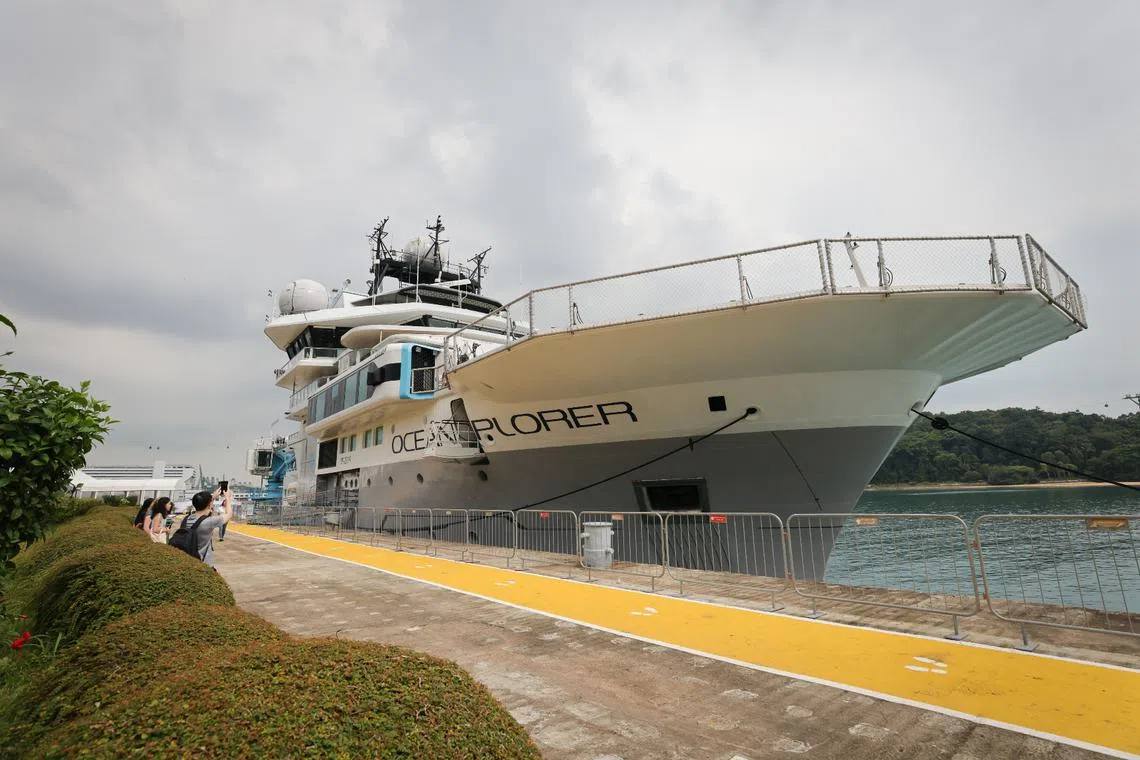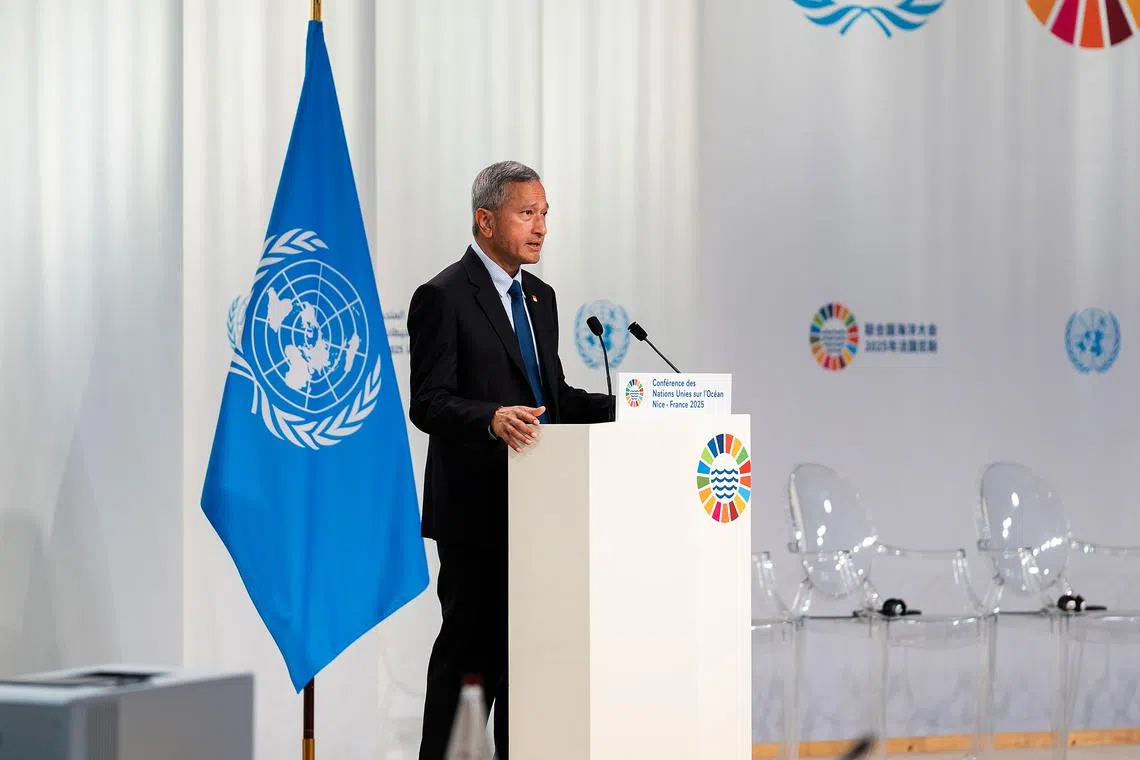S’pore researchers to go on deep sea expedition with non-profit OceanX in October: Vivian
Sign up now: Get ST's newsletters delivered to your inbox

The expedition will bring together scientists from the region, especially other small island developing states.
ST PHOTO: ONG WEE JIN
NICE, France – Researchers from the National University of Singapore (NUS) are planning to embark on a deep sea biodiversity expedition to the high seas in the eastern Indian Ocean in October, said Singapore’s Foreign Minister Vivian Balakrishnan on June 10.
The expedition, in collaboration with US-headquartered non-profit OceanX
“This will give (researchers) an opportunity to document and to survey deep sea biological material,” he said, adding that the findings will help to deepen understanding of the oceans.
The Indian Ocean is the body of water between South-east Asia and the African continent. The high seas, which make up about two-thirds of the ocean, refer to ocean areas outside national jurisdictions.
Dr Balakrishnan on June 9 said, on behalf of the Alliance of Small Island States (Aosis), that it was important for small island developing states to lead, and not just participate in, ocean-related scientific expeditions
Aosis is a grouping of 39 small-island and low-lying coastal developing states including Singapore, Palau, the Maldives and Belize.
Mr Mark Dalio, founder and co-chief executive of OceanX, told The Straits Times that its partnership with NUS “reflects OceanX’s ongoing commitment to advance ocean science in South-east Asia”.
“This mission will generate vital data on deep sea biodiversity and ecosystem health, strengthen the region’s scientific knowledge base, and support informed decision-making for ocean stewardship,” he said. “We are proud to enable this next chapter of exploration into one of the region’s least studied environments.”
NUS’ Professor Peter Ng, the chief scientist for the upcoming expedition, said the collaboration between NUS and OceanX will involve researchers from the university’s Lee Kong Chian Natural History Museum and Tropical Marine Science Institute (TMSI).
They will be joined by researchers from Nanyang Technological University, as well as scientists from South-east Asia and other small island states, whom the NUS team is collaborating with, said Prof Ng, the former head of the museum and TMSI.
The scientists will explore and study deep sea biodiversity, environmental DNA and microbial ecosystems in the international waters of the Christmas Island Seamount Province, located in the eastern Indian Ocean.
“This expedition is intended to generate scientific baselines that support future conservation and ocean management,” said Prof Ng. “This project, funded by the National Research Foundation and NUS, will enhance our knowledge of the deep sea, strengthen regional ties and provide opportunities for capacity building.”
Dr Balakrishnan said Singapore believes the expedition will contribute to the shared global goals of advancing ocean science education and capacity building.

Foreign Minister Vivian Balakrishnan delivers a speech at the Third United Nations Ocean Conference in Nice, France, on June 10.
PHOTO: MFA
In his address to the summit, which brings together 193 UN member states, the minister said the ocean is under severe threat from rising temperatures, acidification, overfishing and plastic pollution. “As a low-lying coastal city state, Singapore is at risk due to rising sea levels, coastal erosion and the risk of flooding,” he added.
These challenges demand a multilateral solution – one that is underpinned by the United Nations Convention on the Law of the Sea (Unclos), said Dr Balakrishnan.
Unclos sets out the legal framework for all activities carried out in the oceans and seas.
In 2023, Singapore helped to broker an agreement
The High Seas Treaty, officially called the Marine Biological Diversity of Areas Beyond National Jurisdiction Agreement, will enter into force after 60 countries ratify it.
French President Emmanuel Macron said on June 9 that 55 countries have done so
Dr Balakrishnan said it was crucial for this treaty to enter into force if the ocean and marine resources are to be conserved and sustainably used, and urged other countries to ratify the agreement.
He also said that Singapore would be renewing 15 of the past voluntary commitments it made to support ocean health, and undertaking 12 new ones.
Past commitments include environmental research programmes such as the Marine Climate Change Science Programme and efforts to promote green financing in the maritime industry.
It also conducted ocean-related courses for fellow developing countries, such as on how coastal biodiversity can be managed under urban pressures.
On the new commitments, Dr Balakrishnan pointed to Singapore’s first seagrass restoration project, launched in September 2024, saying these ecosystems will contribute to global climate efforts, given that these habitats are the “lungs of the sea”.
He also cited the 100k Corals Initiative
“We believe this effort will support marine biodiversity and protect us from coral erosion in the seas around Singapore,” he added.
Singapore will also continue to provide capacity building assistance to developing countries to address ocean-related challenges, Dr Balakrishnan said. The Republic has conducted over 60 courses for more than 1,600 foreign officials under the Singapore Cooperation Programme Sustainability Action Package.
“Over the next year, we will conduct more of such courses on the state of blue carbon science, policy, finance and achieving high-quality outcomes,” he said.
Dr Balakrishnan added: “Singapore commits to working with all our partners to restore the health and to enhance the resilience of our oceans. The choices we make today will define the legacy we leave behind for our future generations.”
Audrey Tan is an assistant news editor overseeing sustainability coverage. She has reported on the environment for more than a decade and hosts the Green Pulse podcast series.



